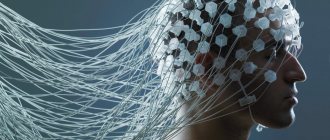In the modern world, it often happens that a person has to deal with neurotic and mental disorders. This is due to the fast pace of life, constant stress and problems, and an unstable emotional state.
Neurosis-like schizophrenia is a mild form of schizotypal personality disorder, which is similar to neurotic in some symptoms. This disease is quite rare, not more than 0.5% of all cases. As a rule, it is easily treatable and does not require isolating the sick person from society, but it is not completely curable and requires monitoring by specialists for the rest of his life.
Yes, these two diseases have similarities, such as:
- hypochondria;
- depression;
- obsessive states;
- the presence of fears in a person.
Many people believe that neurosis can develop into a schizotypal disorder, but this is not the case. Neuroses arise as a consequence of previous psychological trauma, as well as complex internal and external conflict, due to severe stress, chronic fatigue, and after childbirth.
Such a pathology, most likely, will not be chronic continuously and will remind itself of itself with infrequent exacerbations. People around may not notice that a person is experiencing neurotic disorders. The patient remains critical of both himself and the circumstances around him. He notices changes in himself, worries about this, turns to specialists and experiences hypochondria, thoroughly studying the symptoms of various diseases and trying them on himself, just like a schizophrenic.
A person with pseudoneurotic schizophrenia can live without noticing serious changes in himself for quite a long time, up to three decades. However, during the course of the disease, all kinds of neurotic and mental personality disorders progress. People with this disease rarely complete their education, work in the same place for a short time, and it often happens that they cannot start a family. The disease forces you to take medications for a very long time, and sometimes throughout your life.
The patient has no desire to take care of himself, he looks unkempt, as a rule, everyday life does not bring productivity, the person experiences various fears that are absolutely groundless, and sometimes there is a craving for studying subjects that are boring for other people, for example, philosophy. Often, a patient’s phobias become simply absurd and progress; if, for example, a person is afraid of buses for some reason, he will soon stop using this type of public transport altogether.
Schizotypal disorder, unlike neurosis, occurs in a person regardless of whether he has experienced any stress that traumatized his psyche and regardless of his character. Patients may become confused about time and location, or confuse themselves with another person. Even when the period of psychosis ends, one cannot say with certainty that the person is absolutely normal.
So, what are the differences?
Neurosis-like schizophrenia
- Occurs after severe stress experienced that affected the patient’s mental state
- Occurs regardless of the circumstances and character of the person, may occur due to genetic predisposition
- The life values and character of a neurasthenic do not change
- The disease radically changes a person’s personality
- The patient remains critical of himself and the circumstances surrounding him, and worries about his mental health
- A schizophrenic does not understand that he is sick, the ability to criticize is lost
- A person turns to specialists and wants to be cured
- The patient will not go to the doctor on his own, this happens at the insistence of people close to him
- A neurasthenic person in any serious situation is able to pull himself together and pull himself together
- A schizophrenic, even in a life-threatening situation, will not pull himself together
- Can continue to remain a social person, communicate with others, work, engage in education and build a family
- Antisocial, apathetic, avoids society, does not stay in the same job for long, is unable to build relationships
- A complete cure is possible
- A person is almost always doomed to lifelong medication and medical supervision
Treatment
What can you do
Modern medicine has not yet found treatment methods that can completely get rid of this disease. However, properly organized symptomatic treatment will greatly improve the quality of life of those who have become its victims. For this, the patient herself will have to make some efforts, namely:
- maintain proper wakefulness and sleep patterns;
- include time for short rest in your daily routine;
- choose a profession that does not require increased attention and does not involve working at heights or on the night shift;
- scrupulously follow the recommendations of the attending physician, immediately inform him of all changes that occur.
What does a doctor do
The doctor's task is:
- in the individual selection of drugs that improve night sleep and minimize daytime sleepiness;
- in familiarizing the patient with the rules of behavioral therapy and its correction;
- in constant monitoring of the patient’s condition and timely adequate response to changes.
Sluggish schizophrenia is different from neurosis.
This disease has three types:
- psychopathic;
- simple;
- neurosis-like schizophrenia.
It is considered a transitional form, since the symptoms of the disease are superficial. While the classic type leads to rapid degradation of the personality, the sluggish one changes the personality slowly, affecting his behavior, manners and socialization, as described above. The differences between sluggish schizophrenia and neurasthenia are the same as mentioned above. These are absolutely two different ailments, similar only in some symptoms.
Therapy.
Schizotypal disorders, as a rule, do not pose a threat to life and health, both for the patient and for the people around him, so the use of a large number of potent drugs is excluded. Often the patient is prescribed antipsychotics or simple tranquilizers.
If the disease becomes latent, the doctor prescribes antidepressants to the patient to suppress the surging depression. During treatment, psychotherapists use individual and group techniques to achieve healing. To achieve positive dynamics, the support of family and their constant presence is important.
In the treatment of neurotic disorders, various sedatives, tranquilizers and antidepressants are also used. There are many different non-drug methods that are used depending on the nature and course of the disease. The following methods exist:
- hypnosis;
- breathing exercises;
- music therapy;
- color therapy;
- phototherapy and others.
Hypnagogic hallucinations in neurosis
Hypnagogic hallucinations are hallucinations that occur before going to bed. The causes of such phenomena are stressful situations, depression, anxiety, excessive emotionality, as well as alcohol and drug abuse.
Auditory hallucinations before sleep often accompany neurotics, but they have nothing to do with the various visions that arise in schizotypal, manic states and psychoses.
Hypnagogic hallucinations are different from pseudohallucinations and visual illusions. Hypnagogic hallucinations occur only in a state of drowsiness; many experts claim that every person sees and hears them, but simply does not remember them, because afterwards they fall asleep. But pseudohallucinations are familiar to schizophrenics and people with acute psychosis.
You should not be afraid or worry too much about hearing voices before bed; for people suffering from neurasthenic disorders, this is considered normal. You should consult a psychotherapist in order to get rid of the neurosis, along with which the hallucinations will disappear.
anonymous, Female, 19 years old
Hello. I can't tell this to anyone I know, so I'm writing to you. I can’t, because I’m somehow embarrassed to share such a problem. I'm 19, my social circle is limited to two people, not counting my family. Although my relationship with my family is strained, so we can consider it still two. I am reserved, uncommunicative, emotionally labile, I read a lot, and I only walk alone and only in deserted places. And loneliness is much more pleasant to me than communication. My studies at school were average. I don't smoke, I don't drink. At the age of 15 (almost 16) I had a nervous breakdown, I was in the hospital, but my parents took me away with fear, they say, “after the psychiatric hospital, my life will be ruined.” After some time, I noticed three things about myself. 1) I began to study worse at school and remember information worse. It became difficult for me to concentrate on anything. My parents, who already treated me unkindly at that time, shouted, cursed, and threatened me because of my bad grades. I explained that it was just hard for me, that it didn’t get to me, but my father said that he didn’t care and that I could even bang my head against the wall and still get excellent grades. I must say that I studied in a gymnasium where three skins were torn from the students. Listening to angry parents and trying to cope with the school curriculum, which suddenly became incredibly difficult for me, I experienced constant nervous tension. 2) It became even harder for me to communicate with people. My diction worsened, I began to speak slurred and shyly. I still find it difficult to formulate thoughts out loud, so I prefer texting to correct words and catch myself when I start to get lost or slip off topic. I wouldn’t be able to tell you all this live. I seek solitude, I am somewhat prone to escapism. I wouldn’t leave the fictional/virtual world at all. My parents are unhappy with this and insult me about this. My father says that “he’s tired of looking at my sour face.” You see, he doesn't like that I don't smile. How can I smile? And why should I pretend to be happy when I stupidly cry into my pillow every evening? (You can say that I need to talk to my parents and all that, but I have already been advised this. And I will not put up with them even at gunpoint. It is painful for me even when they look at me. They always say that I'm bad! Believe it or not, I write down particularly interesting insults) 3) the last thing that I noticed and for which I am writing here. And I’m ashamed to talk about her even anonymously... When I’m alone, it seems to me that I hear voices. And I know that they are inside my head. I feel it when I start thinking about them. At first I thought it was just my thoughts. But they are disorderly, chaotic, completely unexpected. Men's, women's, children's. And not a single friend! I can think consciously, and they sound. They swear, talk to each other and rarely to me. And, please, don’t laugh, they even sing... What is this even?! I just want to know what the hell is going on in my head. Sometimes I mentally say “shut up”, I try to shout down, and at least give them a damn. This is the hubbub of the crowd, the buzzing of human voices, sometimes inaudible mumbling and muttering. I seem to be alone, but it’s like I’m in a crowd. It happens that I’m almost falling asleep and suddenly someone loudly and clearly utters some kind of nonsense or a single word. This makes me open my eyes and the dream disappears. Then I lie and listen to them. But sometimes you manage to shut everyone up. Sometimes one voice stands out from the many and tells me something purposefully. I try not to remember or listen. There are no voices when there are loud sounds. Only alone. What is this?? I hope you will say that these are just thoughts... Thank you for reading this far. Sorry for the chaotic presentation.
No, of course, I won’t say that “these are just thoughts” after you yourself have clearly defined everything: “At first I thought that these were just my thoughts. But they are disorderly, chaotic, completely unexpected. Men's, women's, children's. … I can think consciously, and they sound. They swear, talk to each other and rarely to me. ... they even sing... I lie and listen to them.” If you described everything as it is, then so it is. - this is the same doctor as, for example, a surgeon who can classify pain, treat it, predict the development of the disease associated with it, but he cannot know where and how exactly it hurts - the patient must tell about this, and if he expects for a correct diagnosis and treatment, then about any shyness, fear of looking funny, etc. there can be no question of that. There is nothing more important for a doctor than a complete, accurate and truthful description by the patient of his condition. You will need to remember this first of all when you contact a psychiatrist in person. There is no doubt that this needs to be done, but you can and even should choose a specific doctor in order to minimize discomfort during communication. In absentia, regarding what was said in your letter, I can only add that in the first part you describe a picture of a completely typical neurosis, which, as it should be, is formed in an unfavorable family atmosphere and/or during severe emotional experiences, chronic, insoluble conflicts, etc. In the second part of the letter, when you describe “voices,” you are most likely talking about psychosis. Psychotic experiences that occur in solitude or drowsy states are prognostically much more favorable than those that “burst” into clear waking consciousness, deprive them of criticism and disrupt behavior. There is a high probability that all the “voices” you described are of the so-called character. reactive psychosis (i.e. they are not an independent endogenous disease, but a reaction to excessive emotional stress), in this case they will completely go away when you cure the neurosis. I stop here, because in order to find out the full picture of what is happening, you absolutely need a face-to-face consultation with a competent psychotherapeutic specialist, because I formulate my answer by communicating not with you, but with your text on the screen. For a psychiatrist this is a very serious difference. All the best!
The main purpose of psychiatry is the treatment of neuroses and psychoses. These pathologies are increasingly common in the modern world, and the terms have become very common in the practice of psychologists. The human nervous system is susceptible to such negative factors as genetic predisposition and negative environmental influences. At first glance, the symptoms of these diseases are similar to each other. The main difference between neurosis and psychosis is the nature of the damage to the nervous system. Neurosis is considered a mild stage of the disorder. Psychosis is characterized by a severe degree of the disease.
Symptoms and forms of neurosis
Neurosis is a human condition caused by psychological trauma or a prolonged stressful situation. Neurotic disorders deplete the nervous system and are accompanied by autonomic disorders (increased heartbeat, increased sweating, stomach upsets). This condition is characterized by irritability, fatigue, anxious feelings, tearfulness and touchiness, despair and aggressive manifestations, and sleep disorders. With neurosis, a person is able to think clearly, be aware of his actions and independently try to cope with the disease.
Frequent causes of neurosis are traumatic events, prolonged overstrain of the nervous system, internal and external conflicts. The occurrence of the disease is also facilitated by biological and hereditary factors, personality traits, conditions and lifestyle, and improper upbringing. Disturbances in the nervous system occur from continuous emotional and physical stress, which lead to chronic stress. The causes of neurosis also include diseases that deplete the body.
When diagnosing neurotic disorders, there are several main forms:
- Neurasthenia, or chronic fatigue syndrome, in a person, accompanied by irritability, headache, fatigue, and sleep disturbances.
- Hysteria is expressed in a disorder of the motor system (convulsive seizures), in sensory and speech disturbances, as well as in emotional reactions (laughter, screaming, crying).
- Fear is an overwhelming syndrome that is characterized by a general state of anxiety or phobia.
- An obsessive state manifests itself in people with suspicious and anxious characteristics. The main signs for this form of neurosis are obsessive actions, thoughts and memories.
Psychosis and its manifestations
Psychosis occurs against the background of sudden negative events that entail serious mental disorders and loss of a sense of reality.
In psychotic disorders, significant changes are observed in a person's behavior and appearance. This disease is characterized by the occurrence of hallucinations and delusions. The patient becomes depressed and indifferent to the world around him, he is inadequate, inhibited, and his facial expressions are disturbed.
Psychoses are classified depending on the causes of their occurrence:
- endogenous disorders arise against the background of internal neuroendocrine factors; This type includes manic-depressive psychosis and schizophrenia;
- exogenous psychoses manifest themselves as a result of the influence of external factors: severe mental trauma, infectious diseases, alcohol and drug addiction;
- organic psychoses are caused by brain disorders (congenital pathology, tumor, traumatic brain injury, etc.).
The symptoms of psychosis are quite broad. In addition to hallucinations and delusions, this disease is accompanied by disturbances of perception and sensation, emotional instability and mood swings. The patient moves chaotically, speaks indistinctly and abruptly, and is in a sleep-like state. All these symptoms do not occur at once in one patient. Based on the manifestation of certain symptoms, the form of psychosis is determined: depressive, hypochondriacal, affective, and others.
When to see a doctor
In most cases, there is no need to see a doctor about hypnagogic hallucinations, especially if they are episodic and do not interfere with normal functioning. Specialist help is required only when the disorder is accompanied by additional symptoms or occurs very frequently.
Patients are first advised to consult a therapist. He can additionally refer you to a psychiatrist, neurologist, narcologist, or somnologist.
Treatment of psychoses and neuroses
Psychoses and neuroses can and should be treated. To avoid succumbing to neurotic and psychotic disorders, you should lead an active and healthy lifestyle, exercise, do not overwork, avoid stressful situations and undergo regular medical examinations. Any neuroses and reactive psychoses can be cured if you consult a specialist in a timely manner.
Treatment of neurosis of any form is carried out on an individual basis. For therapy to be effective, it is necessary to immediately determine the factors contributing to the development of the disease. Neurosis is treated with medications and psychotherapy. Depending on the type of neurotic disorder, the doctor may prescribe antidepressants, vitamins, and drugs that affect the brain. To completely eliminate neurosis, you need to eliminate the cause of its occurrence or change your view of the situation that led to the disorder.
Regardless of the form of psychosis, the patient is hospitalized because he is in an inadequate state and can unknowingly cause harm to both the people around him and himself. While in the hospital, the patient is treated with psychotropic drugs under the constant supervision of doctors. It is very difficult to cure psychotic disorders, but it is still possible. Any changes and disorders that arise against the background of psychosis have varying stability. Some may disappear without a trace in a short period of time, others last longer and may be resistant to treatment.
Are there hallucinations in neurosis? and got the best answer
Answer from Nobody[guru] any hallucination is not quite a hallucination in the understanding that the majority puts into it)) after all, even a thought is material, and an image is even more material, another question is whether it was created by you, or whether you saw a Someone Thinker existing without you ( 8887) try to talk to them) just don’t be afraid and don’t get emotional
Reply from 2 replies
[guru]
Hello! Here is a selection of topics with answers to your question: Are there hallucinations in neurosis?
Answer from Irina Bon
[guru] B vitamins to help
Answer from Aziz Ulyushov
[active] your mind is slowly going crazy for you and a psychiatrist for you
Answer from Nikolay Kruzhkov
[guru] What psychotropic medications do you use? Amitriptyline? Sonapax? Diazepam? With obsessive-compulsive neurosis, there should be no hallucinations (visual, auditory). What you just called hallucinations is not. These are obsessive ideas. Hallucinations typically occur in paranoid schizophrenia. Have you read General Psychopathology by Karl Jaspers?
Reply from Kosh
[gurus] there are auditory sounds, it seems like the phone is ringing or there is a knock on the door
Answer from Evgeny Egorenko
[master] 1) Why not. Hallucinations occur with neurosis, and with sore throat, and with pyelonephritis. 2) Another thing is that all these conditions (diseases) in themselves cannot be the cause of hallucinations.
Reply from Vodoplyas
[active] Just go to a psychotherapist, they won’t tell you anything useful
Reply from Death Bearer
[newbie] Hallucinations are pathological symptoms that arise from mental disorders in which a person perceives (sees, hears, etc.) something that does not actually exist in the space around him. Hallucinations are a clear pathological manifestation of a mental disorder, since normally, with an unchanged psyche, they are absent in people of all ages of both sexes. This pathological symptom refers to disorders of perception of surrounding reality. Depending on which analyzer the disorder in the perception of surrounding reality occurs, hallucinations are divided into auditory, visual, olfactory, tactile, gustatory, visceral, speech and motor. Hallucinations of any nature can be caused by mental illness, as well as brain damage (traumatic brain injury, meningitis, encephalitis, etc.) or severe pathologies of internal organs. Hallucinations due to severe somatic diseases (internal organs) or brain damage are not a sign of a person’s mental illness. That is, a person suffering, for example, from heart failure or having suffered a traumatic brain injury, may experience hallucinations, but at the same time he is completely mentally healthy, and the disturbance in the perception of the surrounding reality was due to a serious illness. In addition, hallucinations can also appear in completely healthy people under the influence of substances that affect the functioning of the central nervous system, such as alcohol, drugs, psychotropic drugs, toxic substances, etc. Brief description and essence of the symptom Understanding the essence and scientific definition of hallucinations has been produced during the study of this problem within the framework of the general development of psychiatry. Thus, the translation of the Latin word “allucinacio” means “pipe dreams”, “idle chatter” or “nonsense”, which is quite far from the modern meaning of the term “hallucinations”. And the term “hallucinations” acquired its modern meaning only in the 17th century in the work of the Swiss physician Plater. But the final formulation of the concept of “hallucination,” which is still relevant today, was given only in the 19th century by Jean Esquirol. Thus, Esquirol gave the following definition of hallucinations: “a person is deeply convinced that he has some sensory perception at the current moment, and there are no objects within his reach.” This definition is relevant to this day, since it reflects the main essence of this psychiatric symptom - a violation of the sphere of perception of surrounding reality, in which a person perceives objects that are absent in reality and at the same time is completely convinced that he is right. In short, hallucinations are the perception of something that is not actually present at the moment. That is, when a person smells smells that do not exist in reality, hears sounds that also do not exist in reality, sees objects that are absent in the surrounding space, etc., then these are hallucinations. At the same time, mirages do not belong to hallucinations, since this phenomenon is not a consequence of a violation of mental activity, but a natural phenomenon, the development of which is based on the laws of physics. Hallucinations must be distinguished from pseudohallucinations and illusions, which also refer to disturbances in the sphere of perception of the surrounding world that occur in severe mental disorders. Thus, the main difference between hallucinations and pseudohallucinations is their pronounced outward orientation and connection with objects that actually exist in the surrounding space. For example, a hallucination is that a person sees a spot sitting on a really existing chair, or hears sounds from behind a real existing door, or smells a smell coming from a ventilation system that exists in reality, etc. Pseudohallucinations are the opposite.
Psychoses and neuroses are two very similar concepts that are confused not only by ordinary people, but also by some doctors with experience in the neurological and psychiatric fields. In fact, these are different pathological human conditions that require an individual approach and treatment.
Psychosis is a human mental disorder consisting of strange and unusual behavior for society, a disorder in the perception of the real world around us, as well as an inadequate reaction to external stimuli.
It is classified depending on the etiology into the following groups:
- Endogenous psychoses - can develop against the background of disorders of neurohumoral regulation;
- Exogenous - appears under the influence of severe stress, drug or alcohol addiction, inflammatory diseases of the central nervous system of infectious etiology;
- Organic psychoses are associated with a direct violation of the structure of the brain, its traumatization, and impaired blood supply.
Neurosis is a pathological state of the nervous system, its depletion, formed as a result of stress and psychological childhood trauma.
Divided into several forms:
- neurasthenia;
- hysteria;
- fear;
- obsessive state.
The causes of neurosis are biological and social factors such as toxic poisoning, heredity, traumatic brain injury, unfavorable social or living conditions, constant strong experiences at home, at work, and during pregnancy.
Varieties
Hypnagogic hallucinations typically involve visual, auditory, and tactile perception.
A person can hear fragments of phrases, melody, any sounds. Unlike mental disorders, such auditory stimuli are not intrusive. Rather, they are present as a background and do not try to enter into dialogue with the patient or impose any thoughts on them. If this is not the case, you should consult a doctor, as there is a possibility of developing a mental illness.
A feature of the pathology is that after opening the eyes, vision stops.
One of the rarest forms of this pathology. With its development, a person tactilely feels objects and touches to himself, which in reality does not exist.
Differences and symptoms
The main difference between neurosis and psychosis is the fact that the first condition appears against the background of complete physical well-being, that is, the person does not complain of any other health problems. In the second case, the process is formed unnoticed and is a consequence of dysfunction of the endocrine and nervous system.
Neurosis is a somatic, autonomic disorder of the nervous system; psychosis largely affects the psyche and consciousness of the patient.
With neurosis, the patient is critical of himself and those around him, he does not lose touch with the real world and gives a full account of his actions. The patient is able to analyze his condition and admit to himself that he really needs medical help. Psychosis gives an absolutely opposite picture; a person speaks loudly about his own well-being and refuses a medical examination.
Neurosis preserves personality and is a reversible condition that can be treated. Psychosis suppresses one’s own “I” and is less treatable.
The clinical picture is also different. Symptoms of neurosis are psychological discomfort, irritability to the point of embitterment and rage, sudden mood swings, a large number of fears and worries without any good reason, tearfulness, chronic fatigue, accompanied by migraines, insomnia, fatigue under normal loads.
Psychoses are characterized by delusions, auditory or visual hallucinations, slurred speech and inexplicable behavior, and a fixation on certain incidents. The patient limits himself from society, lives in his own separate imaginary world.
As for the question: “Can neurosis turn into psychosis?”, opinions differ here. Some experts argue that these are two unrelated conditions that are not intertwined and give their own special complications. The latter say that neurosis, without proper diagnosis and therapy, exhausts the nervous system so much that in addition to it, the patient’s psyche is involved, as a result of which psychosis can develop.
Features of pathology in children
Children who have developed hypnagogic hallucinations require special attention from parents and doctors. This is evidenced by the stories of the child himself. He can share with his loved ones that someone came to him before going to bed or he heard something that didn’t really happen.
The prevalence of this pathology among children is associated with the immaturity of their psyche and nervous system. Due to vivid impressions during the day or due to overtiredness, the baby may experience various illusions before bedtime.
Parents should try to protect their child from any stress, anxiety, and control his daily routine. If you neglect such symptoms, the child may develop enuresis, insomnia, problems with concentration, and unmotivated aggression.
Diagnosis and treatment
A neurologist, psychotherapist or psychiatrist must listen carefully to the patient, check his tendon reflexes, and observe his behavior and manner of speech. It is important to collect a complete anamnesis of the disease, life, to clarify the presence of concomitant pathologies, household and social living conditions.
Treatment is prescribed individually and consists of two components: taking medications and normalizing the psycho-emotional state.
The most preferred medications are antidepressants (Azafen, Imizin), psychostimulants (Provigil, Sidnocarp), tranquilizers (Tofisopam, Diazepam) and anti-anxiety drugs (Adaptol, Deprim). They improve sleep, eliminate anxiety and depression, reduce negative mood, and reduce tension in the nervous system. Prescribed exclusively by a specialist with the selection of the required dose and duration of medication.
The following social factors must be eliminated or minimized:
- hard work;
- informational and emotional stress;
- violation of routine, sleep, lack of sleep;
- problems with friends and close relatives;
- absence of a loved one, personal life;
- material and everyday problems;
- failure to realize past dreams and goals.
If a person is not able to solve the listed issues on his own, psychologists and psychotherapists will come to his aid; they will model behavior and correct their view of a particular situation.
Additional methods for restoring moral and physical well-being are water procedures, bathing with essential oils, physical therapy, relaxing massage, physiotherapy with sedatives, acupuncture, darsonvalization.









